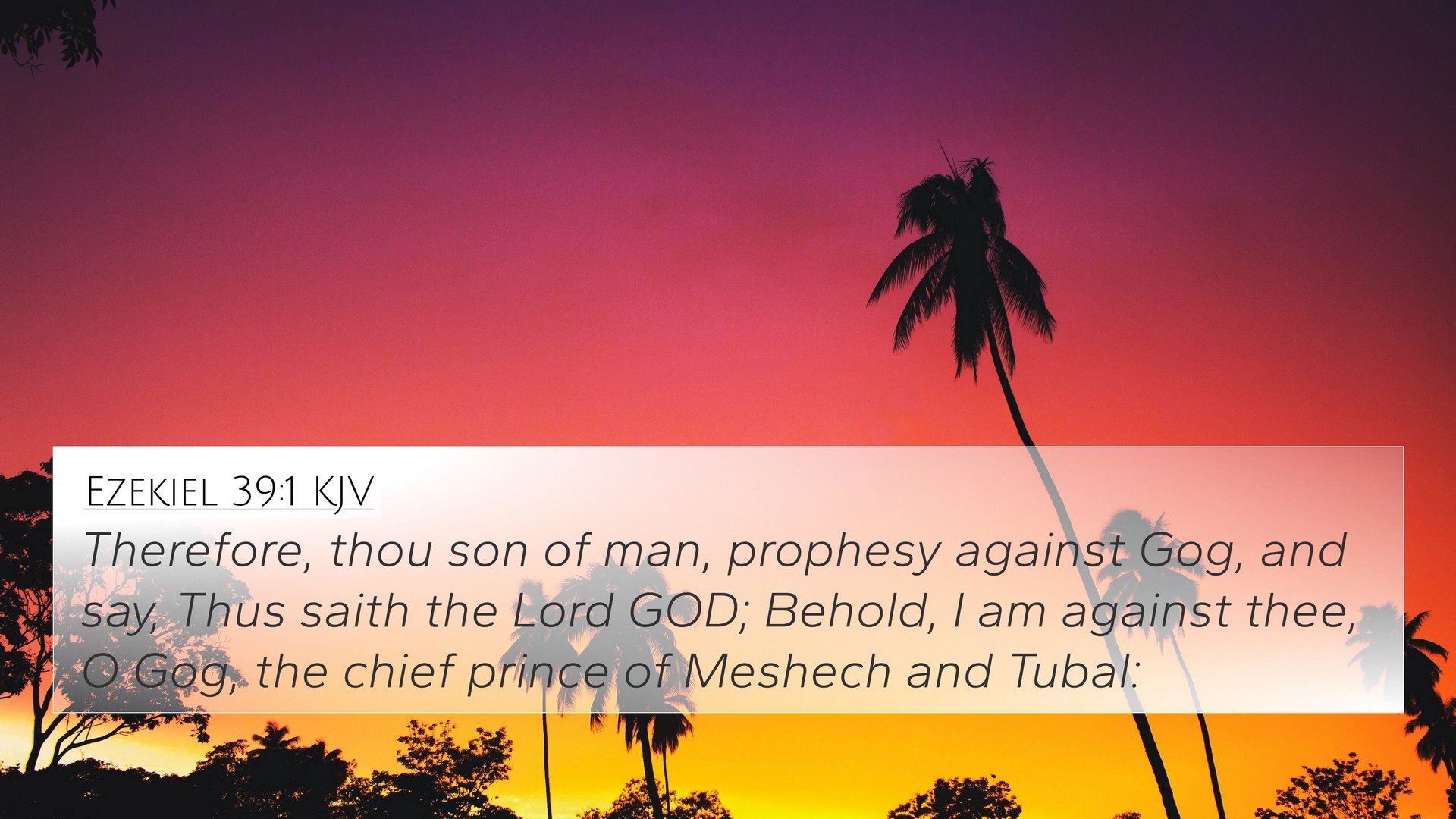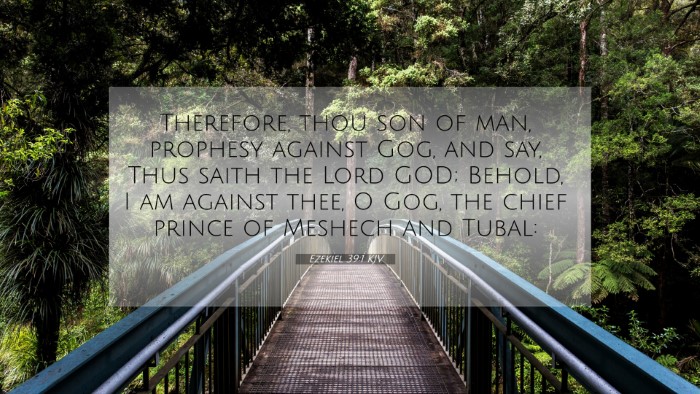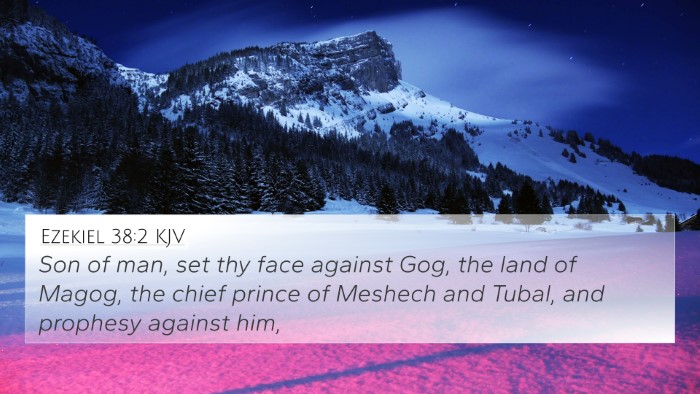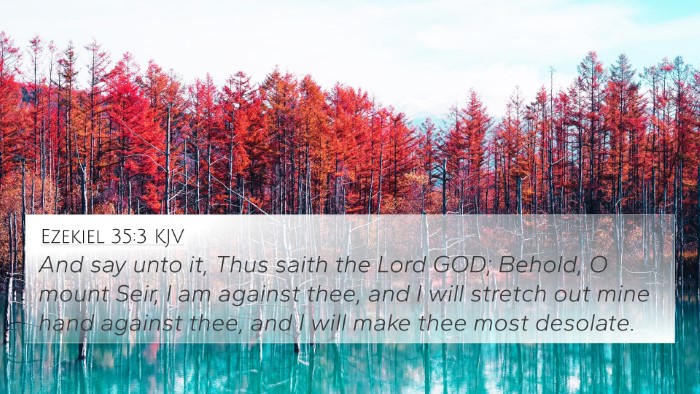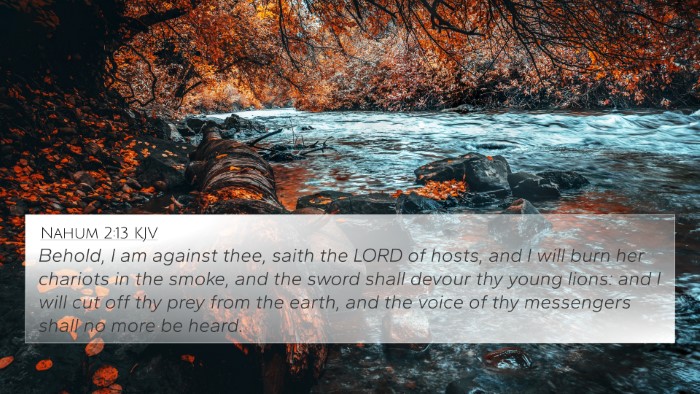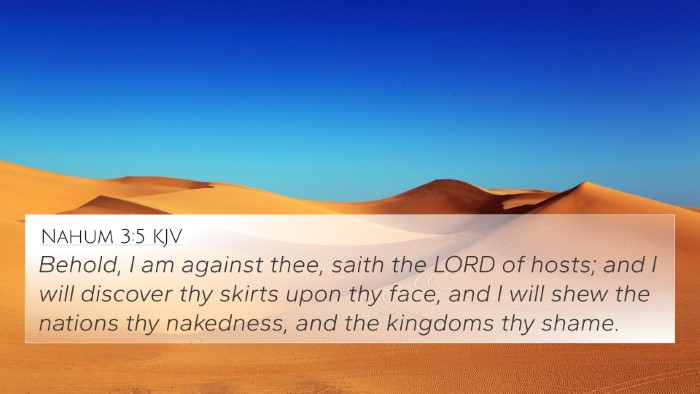Understanding Ezekiel 39:1
Ezekiel 39:1 reads as follows: "And thou, son of man, prophesy against Gog, and say, Thus saith the Lord God; Behold, I am against thee, O Gog, the chief prince of Meshech and Tubal." This verse marks a crucial moment in the prophetic writings of Ezekiel, wherein God instructs the prophet to directly prophesy against Gog, symbolizing national powers that oppose God's people.
Summary of Key Themes
- Divine Opposition: The verse emphasizes God's sovereign authority in opposing forces that threaten His people, highlighting the theme of divine justice.
- Prophetic Role: It illustrates the prophet's role as a mouthpiece for God, who brings forth messages of warning and hope.
- Symbolic Entities: Gog represents a symbolic adversary that embodies the spirit of opposition against divine will.
Commentary Insights
Matthew Henry's Commentary
Henry notes that Ezekiel's prophecy against Gog serves as a warning to nations and leaders who oppose God's purposes. He describes Gog as an archetype of the antichrist, representing all who stand against divine authority. Henry acknowledges the metaphorical nature of the enemies, seeing them as a warning to those who would dismiss God's sovereignty.
Albert Barnes' Commentary
Barnes highlights that God addressing Gog indicates His intention to intervene in the affairs of nations. He interprets the reference to Meshech and Tubal as representative of regions that commonly symbolize a coalition against Israel. This emphasizes God's omnipotence in dealing with threats, and the certainty of judgment upon those who oppose His people.
Adam Clarke's Commentary
Clarke emphasizes the historical context of Gog and the significance of the prophecy for both Ezekiel's audience and future generations. He explains that this prophecy serves both as an assurance of God’s protection over Israel and a foretelling of judgment on oppressive nations. Clarke draws attention to the idea that God’s enemies will be dealt with, affirming the trustworthiness of God's promises to His followers.
Bible Cross References
Thematic connections can be drawn between Ezekiel 39:1 and the following verses:
- Ezekiel 38:2-3: "Son of man, set thy face against Gog, the land of Magog..." This entire chapter sets the stage for Ezekiel's prophetic warning.
- Revelation 20:8: "And shall go out to deceive the nations which are in the four quarters of the earth..." This reference connects Gog with eschatological themes.
- Isaiah 34:5: "For My sword shall be bathed in heaven..." This verse depicts God's judgment upon nations, similar to the judgment proclaimed against Gog.
- Jeremiah 46:25-26: "The Lord of hosts, the God of Israel, saith; Behold, I will punish the multitude of No..." Illustrates God's judgment on nations opposing Him.
- Psalm 46:10: "Be still, and know that I am God..." This verse reinforces God’s sovereignty, similar to the message in Ezekiel 39:1.
- Romans 16:20: "And the God of peace shall bruise Satan under your feet shortly..." Echoes the ultimate victory of God over dark powers.
- 2 Thessalonians 1:6: "Seeing it is a righteous thing with God to recompense tribulation to them that trouble you..." Refers to God's justice towards adversaries.
Connections Between Bible Verses
The prophetic declarations of Ezekiel resonate throughout both the Old and New Testaments, providing a rich tapestry of inter-biblical dialogue. By cross-referencing these verses, one can deepen their understanding of biblical themes relating to judgment, divine sovereignty, and the ultimate victory of God over evil.
Tools for Bible Cross-Referencing
Utilizing tools such as a Bible concordance can greatly enhance the study of Scriptures, allowing one to efficiently locate cross-references and understand the interconnectedness of biblical passages. Implementing a cross-reference Bible study method allows believers to explore the broader context of God's message throughout His Word.
Conclusion
Ezekiel 39:1 encapsulates profound themes of divine judgment and protection, inviting readers to reflect on God’s ultimate purposes for His people. By engaging in comparative Bible verse analysis, individuals can uncover the rich layers of meaning found in these divine narratives, supported by a solid framework of inter-biblical connections.
